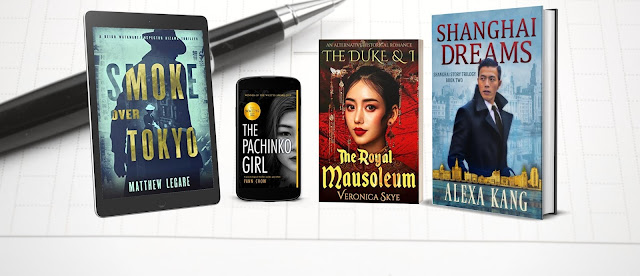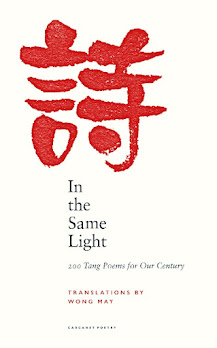'Burma’s Siberia’ is dedicated to K Za Win, one of two poets killed when the military opened fire on civilian protestors last March. Another poet Khet Thi, who had read a rousing poem at K Za Win’s funeral, was later abducted from his home, and died in police custody. This poem was written less than two weeks after K Za Win’s death, as the wider literary circle was still reeling from a series of losses. Its author, Kyi Zaw Aye, was a friend of K Za Win’s who had hosted him in his house the night before he was shot. “Never once / the world is on our side”, it begins, “We unfurl our own flag / we unfurl our own sail / always against the wind”.
Saturday 26 February 2022
“Who Dare Say?” Reading voices of witness from Burma/Myanmar in a time of war
Thursday 24 February 2022
Small London Indie Press Leopard Print Releases First Anthology of Asian Stories
This week's Contemporary Voices column is written by Ivy Ngeow as guest writer for Asian Books Blog. Ivy is a true Renaissance woman (see bio below for all the other hats she also wears).
We celebrate the first Asian Anthology from Leopard Print. Ivy, take it away...
Small London Indie Press Leopard Print Releases First Anthology of Asian Stories
By Ivy Ngeow, Commissioning Editor, Asian Anthology: New Writing Vol. 1
Leopard Print was founded in 2019 by Josh Antony Lee and I. With our design and small business backgrounds, the idea was to welcome more books which we loved to read but felt were lacking: beautiful, diverse and eclectic books by the culturally underrepresented.
Tuesday 22 February 2022
Indie-Spotlight: Selling Books with Asian Main Characters - Part II
Indie Spotlight is a column by WWII historical fiction author Alexa Kang. The column regularly features hot new releases and noteworthy indie-published books, and popular authors who have found success in the new creative world of independent publishing.
Wednesday 16 February 2022
Indie-Spotlight: Selling Books with Asian Main Characters - Part I
Indie Spotlight is a column by WWII historical fiction author Alexa Kang. The column regularly features hot new releases and noteworthy indie-published books, and popular authors who have found success in the new creative world of independent publishing.
Sunday 6 February 2022
Talking About Rakugo 2: The Stories Behind the Storytellers, guest post from Kristine Ohkubo
If you have been following Asian Books Blog, you’ve probably come across the name Kristine Ohkubo. Kristine is a Los Angeles-based indie-author who uses her work to explore topics related to Japan and Japanese culture.
Beginning with a travel guide to Japan, Kristine has published seven books since 2016, with each work exploring either Japan, Japanese culture, or Japanese history.
Kristine has had a deep love and appreciation for Japan and Japanese culture since she was a teenager growing up in Chicago, Illinois. As an adult, her extensive travels in Japan have enabled her to gain insight into this fascinating country, which she shares with you through her writings.
In June 2021, Kristine released an English guide to the traditional Japanese art form known as rakugo. Rakugo storytelling is a unique performance that uses gestures and narration rather than costumes and props; it requires a high degree of skill to perform. A rakugo story is comprised of both narrative and dialog between multiple characters, all of which are conveyed by a single storyteller. The storyteller strives to express the personality of each character by differentiating their tone of voice, choice of words, manner of speaking, and other factors.
The book titled, Talking About Rakugo: The Japanese Art of Storytelling, was written in collaboration with Tokyo-based English rakugo storyteller, Kanariya Eiraku.
Eiraku participated in the Tatekawa-ryu rakugo school established by the legendary rakugo performer Tatekawa Danshi. After learning about the essence of rakugo from the rakugo master, he began offering Japanese rakugo classes in Tokyo in 1991. Sixteen years later, he established his English rakugo classes. This year will mark the 15th anniversary of the establishment of the Canary English Rakugo classes in Tokyo.
Since 2007, he has performed in front of enthusiastic audiences in Japan, the United States, the United Kingdom, Denmark, Australia, New Zealand, Georgia, Kazakhstan, and Laos. He has also translated over sixty classical and contemporary rakugo stories into English.
Eiraku is one of the founding members of the English Rakugo Association in Tokyo. The organization was established in 2020 with the mission to spread rakugo all over the world.
In 2022, Kristine and Eiraku collaborated once again to bring you the second book in the rakugo series, Talking About Rakugo 2: The Stories Behind the Storytellers. The book is officially scheduled to be released on February 7, 2022, which happens to be Eiraku’s birthday!
Friday 28 January 2022
'In the Same Light'? New translations of Tang poetry by Wong May
Guest review by Daryl Lim Wei Jie
Troubled by little
TodayHaply a guest
Am IThe tree haply
My host.
A thousand autumns –
We can cope with.& yet
& yet to deal with the paraphernaliaOf this life
As if one were dead,Friend,
How friendless is that.
Another
theme is poetry itself as a subject, as shown in this Bai Juyi poem:
So my verse takes me
Far from the world’s mockery
Singing madly
To the mountainsPoetry,
It worries me.
Also notable are two rare female Tang poets: Yu Xuanji and Xue Tao. Across the centuries, Wong May, herself a pioneering female poet, gives voice to Yu Xuanji’s frustrations and impossible ambitions as she looks at a list of those who have passed the civil service examinations:
& how I hate the clothes
I stand in,
The cloth they are made of.
They cover up much.A woman’s poems too
Are something to hide?Poetry alas,
& much more besides.Lifting my head
I went through
The list of namesWith plain envy.
Much of the striking verve of these translations can be credited to Wong’s style, and I would like to point out three aspects of this method: the use of space, the freshness of voice, and the willingness to go beyond the text.
The first is well-demonstrated by the examples above: space restores to Tang poetry the necessary emphasis and significance of each character, much harder to achieve in English. If we look again at Liu Zongyuan’s poem above, and compare it to another translation below, it is the inspired use of form that brilliantly conveys the forlornness of the scene, and restores emphasis to the two key words in the second line quoted here: 宾 (“guest”) and 主 (“host”).Am I alone in loving that talent
Goddamn talent
One would wish on no man?
|
君生我未生,我生君已老。 君恨我生迟,我恨君生早。 |
When you were born, I was not yet born; when I was born, you
were already old. You regret that I was born too late; I regret that you were born
too early. (Translation mine) |
Wednesday 19 January 2022
Mesándel Virtusio Arguelles, an introduction to his Filipino poetry in translation
Kristine Ong Muslim recently translated Hollow (original title, Guwang), a collection of some of Arguelles's early poems written in Filipino. Mesándel Virtusio Arguelles’s works and interests encompass books, conceptual writing, translation, film and video, installation, found objects, and text-based experimentation and the poems in Hollow range from ekphrasis to Philippine history. One sample poem, "Deep Well" can be read in Asymptote [https://www.asymptotejournal.com/poetry/mesandel-virtusio-arguelles-deep-well/] and another, "Curse", in Circumference Magazine [http://circumferencemag.org/?p=3073]
Here, in a guest post for the Translation blog, she offers the Introduction to Hollow, written by Amado Anthony G. Mendoza III and translated by herself.










